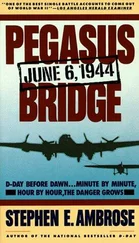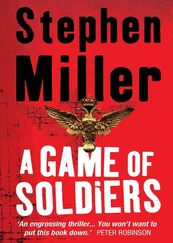Stephen Ambrose - Citizen Soldiers [Condensed]
Здесь есть возможность читать онлайн «Stephen Ambrose - Citizen Soldiers [Condensed]» весь текст электронной книги совершенно бесплатно (целиком полную версию без сокращений). В некоторых случаях можно слушать аудио, скачать через торрент в формате fb2 и присутствует краткое содержание. Жанр: История, на английском языке. Описание произведения, (предисловие) а так же отзывы посетителей доступны на портале библиотеки ЛибКат.
- Название:Citizen Soldiers [Condensed]
- Автор:
- Жанр:
- Год:неизвестен
- ISBN:нет данных
- Рейтинг книги:5 / 5. Голосов: 1
-
Избранное:Добавить в избранное
- Отзывы:
-
Ваша оценка:
- 100
- 1
- 2
- 3
- 4
- 5
Citizen Soldiers [Condensed]: краткое содержание, описание и аннотация
Предлагаем к чтению аннотацию, описание, краткое содержание или предисловие (зависит от того, что написал сам автор книги «Citizen Soldiers [Condensed]»). Если вы не нашли необходимую информацию о книге — напишите в комментариях, мы постараемся отыскать её.
Citizen Soldiers [Condensed] — читать онлайн бесплатно полную книгу (весь текст) целиком
Ниже представлен текст книги, разбитый по страницам. Система сохранения места последней прочитанной страницы, позволяет с удобством читать онлайн бесплатно книгу «Citizen Soldiers [Condensed]», без необходимости каждый раз заново искать на чём Вы остановились. Поставьте закладку, и сможете в любой момент перейти на страницу, на которой закончили чтение.
Интервал:
Закладка:
Stephen Ambrose
Citizen Soldiers [Condensed]
There were some unusual junior officers on the front. One was Lieutenant Ed Gesner of the 4th Infantry Division. He knew survival tricks that he taught his platoon, such as how to create a foxhole in frozen ground: he shot eight rounds into the same spot, dug out the loose dirt with his trench knife, placed a half stick of TNT in the hole, lit the fuse, ran, hit the dirt, got up, ran back, and dug with his trench shovel. Within minutes a habitable foxhole.
The junior officers coming over from the States were another matter. Pink cheeked youth, they were bewildered by everything around them.
Prologue
FIRST LIGHT came to Ste. Mere-Eglise around 0510. Twenty-four hours earlier it had been just another Norman village, with more than a millennium behind it. By nightfall of June 6,1944, it was a name known around the world-the village where the invasion began and now headquarters for the 82nd Airborne Division.
At dawn on June 7 Lieutenant Waverly Wray, executive officer in Company D, 505th Parachute Infantry Regiment (PIR), who had jumped into the night sky over Normandy 28 hours earlier, was on the northwestern outskirts of the village. He peered intently into the lifting gloom. What he couldn't see, he could sense. From the sounds of the movement of personnel and vehicles to the north, he could feel and figure that the major German counterattack-the one the Germans counted on to drive the Americans into the sea, the one the paratroopers had been expecting-was coming at Ste. Mere-Eglise.
It was indeed. Six thousand German soldiers were on the move, with infantry, artillery, tanks, and self-propelled guns-more than a match for the 600 or so lightly armed paratroopers in Ste. Mere-Eglise. A German breakthrough to the beaches seemed imminent. And Lieutenant Wray was at the point of attack.
Wray was a big man, 250 pounds, with "legs like tree trunks," in the words of Lieutenant Colonel Ben Vandervoort, commanding the 505th. "The standard-issue army parachute wasn't large enough for Wray's weight, and he dropped too fast on his jumps, but the men said. Hell, with his legs he don't need a chute. He was from Batesville, Mississippi, and was an avid woodsman, skilled with rifles and shotguns. He claimed he had never missed a shot in his life. A veteran of the Sicily and Italy campaigns, Wray was, according to Vandervoort, "as experienced and skilled as an infantry soldier can get and still be alive."
Wray had Deep South religious convictions. A Baptist, each month he sent half his pay home to help build a new church. He never swore. His exclamation when exasperated was "John Brown!"-meaning abolitionist John Brown of Harpers Ferry. He didn't drink, smoke, or chase girls. Some troopers called him the Deacon, but in an admiring rather than critical way. Vandervoort had something of a father son relationship with Wray, always calling him by his first name, Waverly.
On June 7, shortly after dawn, Wray reported to Vandervoort-whose leg, broken in the jump, was now in a cast-on where he expected the Germans to attack and in what strength. Vandervoort took this in, then ordered Wray to return to the company and have it attack the German flank before the Germans could get started.
"He said, 'Yes Sir,' saluted, about-faced, and moved out like a parade ground Sergeant Major," Vandervoort later wrote.
Wray passed on the order. As the company prepared, he took up his M-l, grabbed a half-dozen grenades, and strode out, his Colt .45 on his hip and a silver-plated .38 revolver stuck in his jump boot. He was going to do a one-man reconnaissance to formulate a plan of attack.
WRAY WAS going out into the unknown. He had spent half a year preparing for this moment, but he was not trained for it. Wray and his fellow paratroopers, like the men at Omaha and Utah beaches, had been magnificently trained to launch an amphibious assault. By nightfall of June 6 they had done the real thing successfully. But beginning at dawn, June 7, they were in a terrain completely unfamiliar to them. In one of the greatest intelligence failures of all time, neither G-2 (intelligence) at US First Army nor the Supreme Headquarters Allied Expeditionary Force (SHAEF) G-2, nor any division S-2 (special staff intelligence) had ever thought to tell the men who were going to fight the battle that the dominant physical feature of the battlefield was the maze of hedgerows that covered the western half of Normandy.
The hedgerows dated back to Roman times. They were mounds of earth raised about each field, about two metres in height, to keep cattle in and to mark boundaries. Typically, there was only one entry into the small field enclosed by the hedgerows, which were irregular in length as well as height and set at odd angles, with beeches, oaks, and chestnut trees on the summit. On the sunken roads, which were shut in by clay banks, the brush often met overhead, giving a feeling of being trapped in a leafy tunnel.
How could the various G-2s have missed such obvious features, especially as aerial reconnaissance clearly revealed the hedges? Because the photo interpreters, looking straight down at them, thought that they were like English hedges-the kind fox hunters jump over-and they had missed the sunken nature of the roads entirely. "We had been neither informed of them or trained to overcome them," was Captain John Colby's comment. The GIs would have to learn by doing, as Wray was doing on the morning of June 7.
The Germans, meanwhile, had been going through specialized training for fighting in hedgerows. They had also pre-sited mortars and artillery on the entrances into the fields. Behind the hedgerows they dug rifle pits and tunnelled openings for machine-gun positions in each corner.
WRAY MOVED up sunken lanes, crossed an orchard, pushed his way through hedgerows, crawled through a ditch. Along the way he noted concentrations of Germans in fields and lanes. He reached a point near the N-13, the main highway into Ste. Mere-Eglise from Cherbourg, where he could hear guttural voices on the other side of a hedgerow. They sounded like officers talking about map coordinates. Wray rose up, burst through the brush obstacle, swung his M-l to a ready position, and barked "Hande hochf" to eight German officers gathered around a radio.
Seven instinctively raised their hands. The eighth tried to pull a pistol from his holster. Wray shot him instantly between the eyes. Two German grenadiers in a slit trench 100 metres to Wray's rear fired bursts from their Schmeisser machine pistols at him. Bullets cut through his jacket. One cut off half of his right ear.
Wray dropped to his knee and began shooting the other seven officers one at a time as they attempted to run away. When he had used up his clip, Wray jumped into a ditch, put another clip into his M-l, and dropped the two German soldiers with the Schmeissers with one shot each. He made his way back to the command post (CP)-with blood down his jacket, a big chunk of his ear gone-to report on what he had seen. Then he started leading. He put a 60-mm mortar crew on the German flank and directed fire into the lanes and hedgerows most densely packed with the enemy. The Germans broke and ran. By midmorning Ste. Mere-Eglise was secure, and the potential for a German breakthrough to the beaches was much diminished.
THE NEXT day Vandervoort, Wray, and Sergeant John Rabig went to examine the German officers Wray had shot. Unforgettably, their bodies were sprinkled with pink-and-white apple blossom petals from an adjacent orchard. It turned out that they were the commanding officer (CO) and his staff of the 1st Battalion, 158th Grenadier Infantry Regiment. The maps showed that it was leading the way for the counterattack. The German retreat was in part due to the regiment's having been rendered leaderless by Wray.
Читать дальшеИнтервал:
Закладка:
Похожие книги на «Citizen Soldiers [Condensed]»
Представляем Вашему вниманию похожие книги на «Citizen Soldiers [Condensed]» списком для выбора. Мы отобрали схожую по названию и смыслу литературу в надежде предоставить читателям больше вариантов отыскать новые, интересные, ещё непрочитанные произведения.
Обсуждение, отзывы о книге «Citizen Soldiers [Condensed]» и просто собственные мнения читателей. Оставьте ваши комментарии, напишите, что Вы думаете о произведении, его смысле или главных героях. Укажите что конкретно понравилось, а что нет, и почему Вы так считаете.
![Stephen Ambrose Citizen Soldiers [Condensed] обложка книги](/books/346737/stephen-ambrose-citizen-soldiers-condensed-cover.webp)








